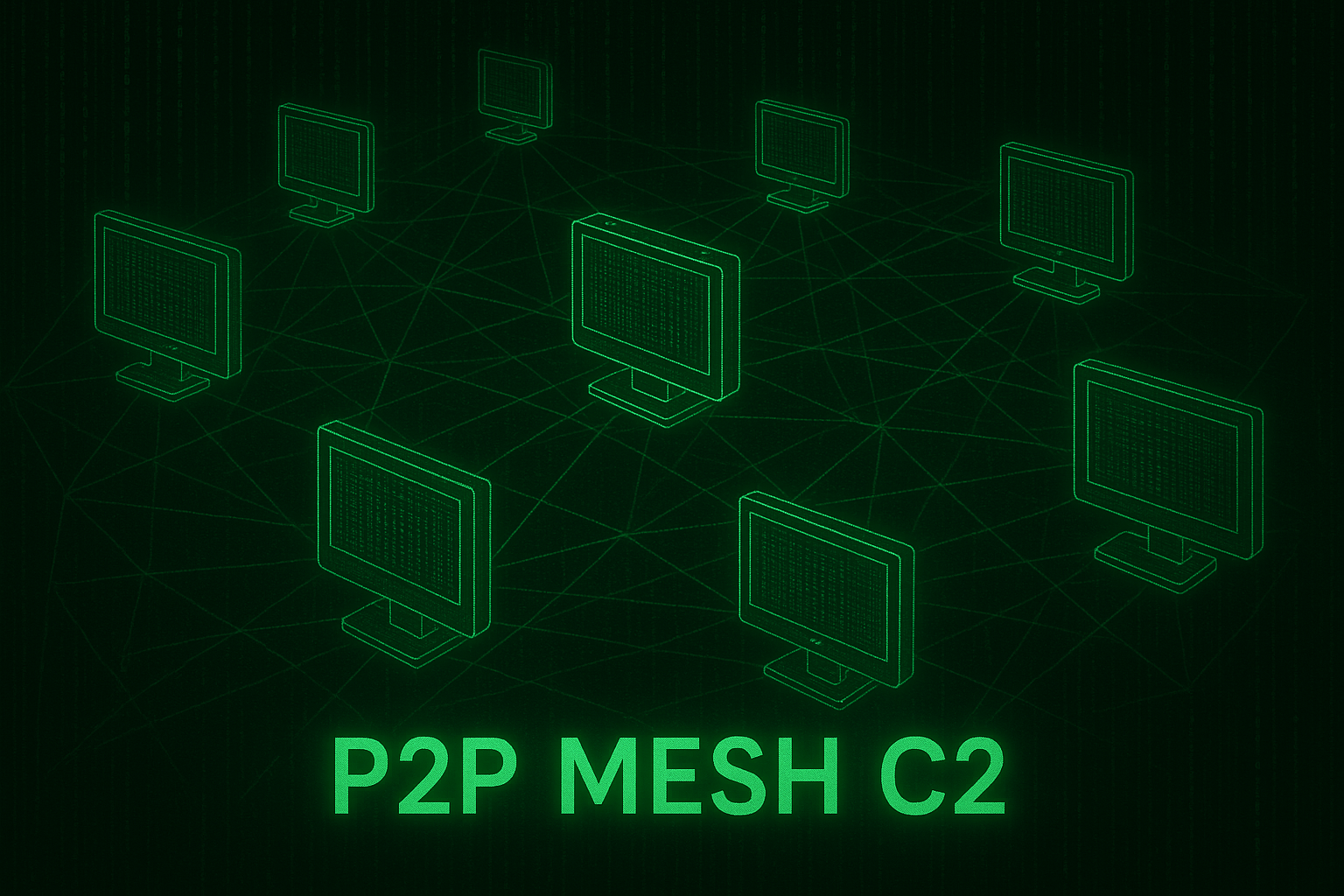Introduction 🙂↕️
Hi there lawful-evil nerds, I made a Proof-of-Concept C2 Framework, but not the usual one.
In this C2 Framework, the implants use a “Gossip System” to talk to each other and share data, so every implant can stay updated with stuff like peer list and commad list. With no single point of failure in command.
This isn’t a production-grade framework, but a PoC I built to learn how P2P syncing and gossip protocols could power a decentralized C2*.
*this project is not completely decentralised but more like “hybrid-decentralised” like a torrent system with tracker
The Components and “Mesh” 🧩
Let me tell you about some organs of the project.
If you go to the github repo of the project you will see 2 folders:
C2/: The C2 Server which contains the API of C2 and a Dashboard made in Python using Flask and SQLite3 as database.implant/: The implant or agent or backdoor whatever you want to call it, made in C which lives inside affected systems and executes commands.
But what is this “mesh” thing?
See, this is just a PoC (Proof-of-Concept) C2, one might even call this a “toy” C2, so I am not going to test this on real systems used by real humans in daily life, and thats why i decided to go with Docker
We can use Docker to start multiple instances of implants in “containers”, which are lightweight isolated environments that package code and dependencies together. Thats going to be our sandbox so we dont need to mess with host system.
And Docker has its own network interface (172.17.0.1/16) so all the implants will be on the same network so they can connect easily.
Not realistic simulation of “network mesh of implants” but good enough to learn about P2P Syncing and play around with our PoC C2, we can also use this in VMs by building the implants inside the VM so we can also use it in Blue Team practice in detection of C2 traffic.
Demo and Hands-on 💥
You are not going anywhere without seeing stuff in action.
Busy? Dont want to read text? Dont want to watch a video? No excuses, I got something for everyone.
Run it yourself!
If you are one of those people that like to just dive in and see stuff work in real time, here’s what you need to do:
Installing
First, run the install script or just git clone the project:
| |
Configuration (optional)
- Navigate to the implant directory:
| |
Change the configuration
Make a copy of
/includes/config.example.hand rename it toconfig.hNow edit the content of the the file according to your setup anc choice
now you are ready
Starting the whole thing
Spin up the mesh of implants and C2 (3 implants by default)
| |
Viewing logs
Now pull up the logs of everything if you want to see the inside work
Open a new terminal window or tab, and run this (uses tmux windows to show logs of C2 server and all implants):
| |
Extra options
To spawn more implants or enable verbose mode:
| |
To use the installer script with custom destination name:
| |
Full walkthrough video
Dont want to try by yourself?
I’ve made a demo video of this project so which goes through from the starting of implants to command broadcast, execution, gossiping, everything!
You can watch that if you have a couple minutes to spare and want to know see it in action:
Important parts in action
If you dont want to try by yourself or open youtube, you can go through the texts below and you can see some important part of projects in action (showing everything will make it too big):
Implants registerng
Once we start the spin up the C2 and a couple implants (using ./start.sh) we can see them registerng by sending Heartbeats to C2, you can see it in the flask logs of C2 and also in the Dashboard at localhost:8000 or whatever your port is.
But before registerng they also get an “initial” peer list from C2 server so they can gossip with each other, and this list will get updted through syncing too!
Sending commands
You can go to dashboard and send commands from there, there are two target modes, All and Singular.
All=> Command will be broadcasted to every implant in mesh and they all will share with newer implans too those who join after the coommand was sentSingular=> Command to a single implant, wont be shared with other implants
And now after we hit send payload button we can see the implants receving the commands in a couple second:
Seeing results
Every command in command log table has a result button, press it when its there (if its not there you gotta wait for implants to send them, just a couple seconds)
Got ’em!
If you dont see results from all implants just wait a couple more seconds they all different result timing (due to extra jitter time added to avoid showing a pattern to defense system)
“Gossiping” (syncing)
When new implant joins the network it will receive the broadcasted commands automatically through syncing
As we can see the new implant got the command we sent before through gossiping with other implants. You can also check that command’s result, it will get updated too!
THIS IS SO CUTE LOL
Now the older implants will update their Peer List through syncing with new implant
Conclusion
This project took a long time, because when I started it I did not even know what is C2 and how it works, I was also beginner in C.
But it was a really good learning experience, and this is my first real cybersecurity project 🥹
If you see any issues in it or got any questions, you can contact me :)
using “gossiping” inside of “syncing” is so fancy lol
Links
GitHub: https://github.com/pratiksingh94/mesh-c2
YouTube Demo: https://www.youtube.com/watch?v=CYCQuMdeyTY
Tech stack:
Implant:
C2 Server:
Others:







